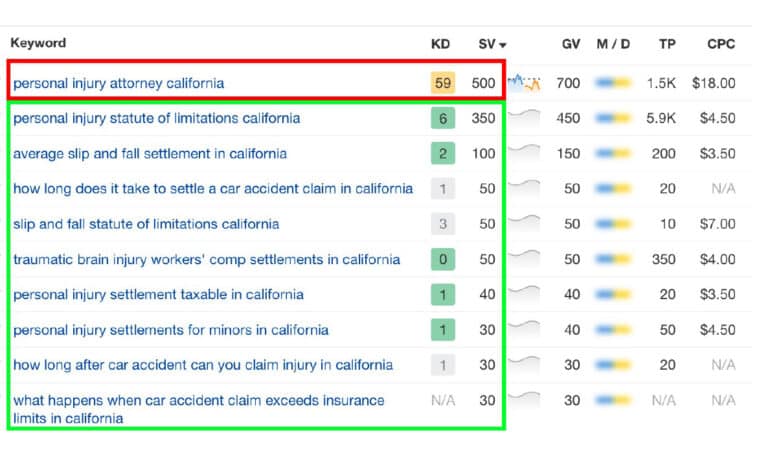At its core, digital public relations, or digital PR, is about enhancing your firm’s visibility and establishing thought leadership through strategic online placements, content and partnerships. This digital-centric approach to PR is powerful for attorneys and law firms for several reasons.

Table of contents
- Evolving Search Landscapes
- The Synergy Between Digital PR and SEO
- Digital PR for Attorneys: A Three-Step Strategy
- 1. Develop a Content Strategy
- 2. Build Business Citations and Attorney Profiles
- 3. Build Relationships With Media and Other Influential Platforms
- Recap: Using Digital PR to Amplify Your Online Presence
Evolving Search Landscapes
As search technologies become increasingly sophisticated, particularly with the integration of AI, the ability to stand out in search results hinges on more than just keywords and backlinks. Digital PR positions your firm as a credible source of information and expertise, which is critical in an era where relevance and authority drive search visibility.
Building Online Authority and Enhancing Brand Awareness
Google’s principles of Expertise, Authoritativeness and Trustworthiness (E-A-T) are paramount in today’s digital ecosystem. Digital PR efforts, from securing mentions on well-known platforms to generating authoritative content, directly feed into enhancing these aspects of your online identity.
Digital PR is an engine for boosting brand awareness. It elevates your firm’s profile and distinguishes your services in a crowded marketplace. By consistently presenting your firm across various media outlets and platforms, you create a recognizable and reputable brand. This recognition is invaluable, as clients are more likely to engage with a firm they are familiar with or have seen referenced across multiple channels.
Brand awareness also fosters trust, and in the legal field, trust is a currency that translates into higher conversion rates and new client acquisition. Potential clients who recognize and respect your brand are more likely to consider your services when in need of legal assistance.
The Synergy Between Digital PR and SEO
Digital PR and SEO are interconnected and have a mutually beneficial relationship. A good digital PR strategy not only elevates your firm’s brand and authority but can significantly improve results from your search engine optimization efforts. Here’s how.
Backlinks and Visibility
Backlinks to your website from reputable sites (a hallmark of successful digital PR campaigns) are instrumental in improving your website’s authority. These backlinks signal to search engines that your site is a credible source of information, thereby increasing your ability to rank higher in search engines.
Enhanced Local SEO
For solo attorneys and law firms serving specific geographic areas, local visibility is crucial. Business citations and comprehensive attorney profiles on platforms like Avvo and Justia enhance local SEO efforts, making your firm more visible to potential clients in your area. These profiles serve as authoritative signals to search engines, reinforcing the local relevance of your practice.
Note: Many law firm directory websites sell premium profiles and ad placements with the idea that you can, or will, get leads directly from their platform. While this does occasionally produce leads directly, the real value of these directories is the citation and backlink they include to your website.
Digital PR for Attorneys: A Three-Step Strategy
In traditional PR, the aim is to feature your firm in established media channels, creating a positive public image through strategic communication and relationship-building. Similarly, in digital PR, the objective is to broaden your law firm’s online footprint, utilizing the vast reach of the internet to enhance brand visibility and develop engagement through your content strategy.
Here are a few practical tips to help you navigate the digital PR landscape.
1. Develop a Content Strategy
Crafting informative and helpful content is the foundation of a successful digital PR strategy. This content should both highlight your expertise in the area of law you practice and address the concerns and questions of your prospective clients.
Start by creating a list of questions and concerns that often arise when you first meet with a prospective client. Writing content that addresses those things and then publishing that content on your website does two things. First, it helps your firm be found when someone in your geographic area of practice is looking for an answer to that question. Second, it helps you stand out as the local legal expert who can help them with that problem.
Blogging about recent and relevant local events pertaining to your practice area from a legal standpoint is another great way to build brand awareness. This can get you found when someone is interested in that local event. It also helps establish your law firm’s brand in your local market.
Another great way to build out your content strategy is through keyword research. From an SEO perspective, many keywords are extremely competitive. For example, personal injury SEO is one of the most competitive SEO markets out there. So, keywords like “personal injury attorney California” are going to be very difficult to rank for right out of the gate.
But there are still many great keywords that are actually easy to rank for because search engines like Google don’t have many really great answers yet. (This is where you come in.)
Here’s an example of the opportunities:

Note: “KD” stands for “keyword difficulty” (how hard it would be to rank on page one for that keyword). “SV” represents “search volume,” which is the average number of monthly searches for that keyword.
So, if you’re a PI attorney in California, you’ve got a good shot at ranking on page one of Google by creating a blog post covering “personal injury statute of limitations California.” This keyword is getting around 350 searches per month, and I would imagine a fair number of them feel they have a personal injury case and want to know if the statute of limitations has expired.
With free tools like Ahrefs Keyword Generator and Moz Keyword Explorer, you can find many more keyword opportunities like this to add to your content strategy.
2. Build Business Citations and Attorney Profiles
A comprehensive digital footprint across business citation sites (websites that list a business name, address and phone number) and attorney profile and directory sites is key to being found online. Accurate, consistent information across directories enhances your firm’s credibility and search engine visibility.
Attorney profiles and directories often allow for backlinks to your firm’s website. These backlinks are invaluable for SEO, as they signal to search engines that other reputable sites endorse your website and content, thereby boosting your site’s authority and search ranking ability. Furthermore, many of these legal directories require attorneys to verify their bar status to be included. Google knows this and, therefore, places more authority on backlinks from these sites.
Implementing an effective strategy for building and maintaining business citations and attorney profiles requires a proactive approach. Regular audits of your listings to ensure accuracy, updating your profiles to reflect any changes in your firm (particularly your firm’s name, address, phone number and website), and actively seeking opportunities for new citations are important practices.
Tools such as BrightLocal and Yext provide a streamlined way for law firms to manage a vast majority of these online citations for their firm.
3. Build Relationships With Media and Other Influential Platforms
Engaging with the media, bloggers and industry influencers can significantly amplify your digital PR efforts. By positioning your firm as a go-to source for expert commentary and insights, you can not only build valuable backlinks but also enhance your firm’s brand visibility and authority in your geographic service area.
A quick and easy way to start engaging with media outlets and getting more media mentions is through platforms like Connectively (previously known as HARO) and Featured.com. These platforms connect attorneys with journalists who are seeking expert opinions and quotes for their stories. This, in turn, can enhance a law firm’s visibility and help establish expertise and credibility online through media exposure.
Recap: Using Digital PR to Amplify Your Online Presence
Digital PR is a fantastic opportunity to amplify your online presence, enhance your brand recognition, and ultimately attract more new clients.
To get started, focus on developing content that addresses common client questions and showcases your experience and expertise. This content should be distributed through the firm’s website and relevant online channels to improve discoverability. Next, ensure your law firm is accurately listed across all relevant business citation sites and legal directories, which will strengthen SEO and local visibility. Finally, by engaging with the media, you can gain media mentions that further establish your authority and credibility.
Image © iStockPhoto.com.

Sign up for Attorney at Work’s daily practice tips newsletter here and subscribe to our podcast, Attorney at Work Today.

Getting Clients: An Essential Guide for Lawyers Starting Out or Starting Over
BY MERRILYN ASTIN TARLTON
The biggest obstacle to building a book of business (besides more time!) is knowing where to start. Getting Clients makes that the easiest part, with straightforward and knowledgeable guidelines, worksheets and the necessary sense of humor.
















